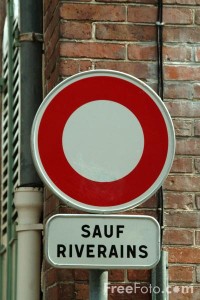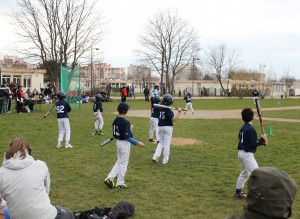One of the biggest benefits of being an iffy French speaker in a French-speaking country is that when reading or hearing French, you can usually persuade yourself to place your full faith in whatever translation best suits your particular needs at any given moment. You’ve got the English speaker’s appreciation of cognates, a few dimly recalled Latin roots in your back pocket, and possibly the benefit of being highly self-suggestible (viz. that whole La Grande Dangereuse episode from a few weeks back).
This willingness to believe what needs to be believed can be both an advantage and a liability. Take, for example, that sign at right with the scary red circle and the daunting “SAUF RIVERAINS!” slogan and imagine it at the entrance to a charming little alley with a delightful little pastry shop at the other end. Perhaps they’re passing out free samples of all manner of buttery baked goodness, or perhaps it’s Free Red Wine For Americans day, it doesn’t really matter. The point is they have it, you want it, and you can’t get to it because of that pesky little sign.
Now, a French speaker knows that “Sauf Riverains” means “Except Residents” and that only people who live there can drive down there and eat the implied free croissants and drink the theoretical free red wine. I, however, know that “sauf” means “except” and after that things get really hazy really fast. However, with the Magic of Misplaced Confidence, I can easily convince myself that “Sauf Riverains” almost certainly means “Except People Who Like Rivers” or “Except People Who Have Been To A River When It’s Been Raining,” or even “Except You, Sid…Come on Down!” These are all in play.
I try to learn French, I really do, but frankly, it’s more difficult than I anticipated. Not only do they have words for everything, but most of those words appear to be pronounced in exactly the same way with meanings that can only be divined by context.
Perhaps French people have furtive little hand signals designed to throw off non-native, would-be French speakers that they use to tell one another what they’re on about. For example, an elderly chap walking into the local boulangerie might throw a little old-school hand-jive as he enters to indicate that when he says “Je voudrais deux chaussons,” he means he’d like the chaussons one might eat for breakfast and not the ones he might wear to keep his feet warm around the house (or even the hunting trip he’s going on next week, the word for which also sounds quite similar to my calcified ears). Or perhaps a normal person would clue into the fact that someone in a bakery is likely not asking for a pair of slippers or the best way to field dress a wild boar and probably just wants a nice jammy pastry. Perhaps.
I think I had it in my head that with the proper tilt of my theoretical beret and perhaps a bit of Gallic flair in my carriage, well, it’d be a simple matter of just adding a suitably cinematic French accent to some implausible high-school Spanish and I’d more or less be kicking it Flaubert-style. Those rosy expectations have proven to be, shall we say, overly optimistic, often comically so. Also, did you know that most French people don’t use the term “kicking it Flaubert style,” either in English or in French? It’s true.
So far, I have told a matronly innkeeper that I loved her (to be fair she had just brought us a really tasty rhubarb crisp), complimented a young woman realtor on her high availability, and, memorably, spent an entire baseball game yelling “Communist! Communist!” (“Gauchiste!”) at small children whose only transgression was to bat left-handed (“Gaucher,” alas). Figuring that last one out really went a long way towards explaining some of the looks from fellow parents in the stands. Apparently, when the French say “potato,” I say “Bolshevik.”



